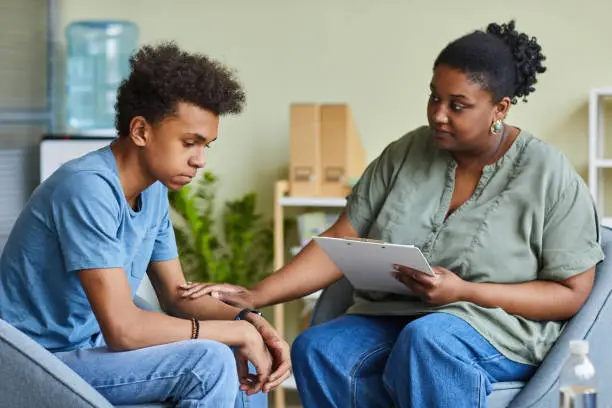In the fast-paced and demanding world that teens navigate today, mental health is a critical aspect often overlooked. The role of a psychiatrist becomes crucial in ensuring the holistic well-being of teenagers. Let’s delve into the signs that indicate a need for psychiatric consultation and how these professionals can contribute to teens’ mental health.
Contents
Common Mental Health Issues in Teens
 Understanding the prevalent mental health issues in teenagers is crucial for early identification and targeted intervention. Adolescence is a time of significant change, and many teens grapple with mental health challenges. Here’s an exploration of the common issues that a psychiatrist often encounters when working with teens:
Understanding the prevalent mental health issues in teenagers is crucial for early identification and targeted intervention. Adolescence is a time of significant change, and many teens grapple with mental health challenges. Here’s an exploration of the common issues that a psychiatrist often encounters when working with teens:
- Anxiety Disorders
- Generalized Anxiety: Persistent and excessive worry about various aspects of life.
- Social Anxiety: Intense fear of social situations and interactions.
- Panic Disorders: Recurrent and unexpected panic attacks.
- Depression
- Persistent feelings of sadness and hopelessness.
- Changes in sleep patterns and appetite.
- Loss of interest in activities once enjoyed.
- Attention-Deficit/Hyperactivity Disorder (ADHD)
- Inattention: Difficulty sustaining attention and organizing tasks.
- Hyperactivity: Restlessness and impulsive behavior.
- Impulsivity: Acting without considering consequences.
These mental health issues can significantly impact a teen’s daily life, affecting academic performance, relationships, and overall well-being. Recognizing the signs and symptoms is crucial for timely intervention and providing the necessary support to help teens navigate these challenges.
Understanding the unique aspects of each mental health issue allows psychiatrists to tailor their approach to the individual needs of the teenager. By addressing these mental health concerns early on, teens can receive the support they need to lead fulfilling and healthy lives.
Recognizing Signs When to Consider Consulting a Psychiatrist
 Navigating the complex landscape of teen mental health requires a keen awareness of signs that may indicate a need for professional intervention. Recognizing these signs early on is crucial for timely and effective support. Here’s a closer look at the indicators that suggest it’s time to consider consulting a psychiatrist:
Navigating the complex landscape of teen mental health requires a keen awareness of signs that may indicate a need for professional intervention. Recognizing these signs early on is crucial for timely and effective support. Here’s a closer look at the indicators that suggest it’s time to consider consulting a psychiatrist:
- Behavioral Changes
- Abrupt mood swings
- Increased irritability
- Uncharacteristic aggression
- Academic Decline
- Consistent and significant drop in grades
- Struggling to complete assignments
- Social Withdrawal
- Avoidance of social activities
- Isolation from friends and family
- Persistent Emotional Distress
- Continuous sadness or anxiety
- Overwhelming emotional turmoil affecting daily life
- Impact on Daily Functioning
- Difficulty concentrating
- Changes in sleep patterns
- Decline in personal hygiene
- Communication Difficulties
- Persistent challenges expressing emotions
- Difficulty in open communication
- Changes in Sleep Patterns
- Insomnia or excessive sleeping
These signs collectively highlight when a teen’s mental well-being may be at risk. If you observe one or more of these indicators, it’s advisable to consider seeking the expertise of a psychiatrist to provide valuable insights and support.
Understanding the Role of a Psychiatrist

Psychiatrists play a pivotal role in supporting the mental well-being of teenagers. Their expertise extends beyond mere diagnosis to encompass comprehensive treatment and ongoing care. Let’s delve into the multifaceted role of a psychiatrist in the context of teen mental health:
Assessment and Diagnosis
The first step in a psychiatrist’s role involves a meticulous assessment to identify the specific mental health issues a teenager may be facing. This includes in-depth discussions, standardized assessments, and collaboration with other professionals to ensure a comprehensive understanding.
Treatment Approaches
Once a diagnosis is established, the psychiatrist tailors a treatment plan to address the unique needs of the teen. This may involve a combination of psychotherapy, medication management, and holistic approaches, with the goal of fostering positive mental well-being.
Collaboration with Other Professionals
Recognizing that mental health is multifaceted, psychiatrists collaborate with a network of professionals. This includes psychologists, social workers, and school counselors, ensuring a unified and coordinated effort in providing support.
Building Rapport
Establishing trust and rapport with the teen is fundamental to effective therapy. A psychiatrist creates a safe and non-judgmental space, encouraging open communication and the expression of emotions.
Involvement of Parents/Guardians
Family plays a crucial role in a teenager’s mental health journey. Psychiatrists involve parents or guardians, recognizing the importance of a support system in the teen’s life. This collaborative approach ensures a holistic and sustained effort towards positive mental well-being.
In summary, a psychiatrist for teens is not just a diagnostician but a compassionate guide on the path to mental wellness. Their role extends beyond the clinical realm, encompassing understanding, collaboration, and ongoing support to empower teenagers to lead mentally healthy lives.
Therapeutic Techniques Used By a Psychiatrist for Teens
 Psychiatrists employ a variety of therapeutic techniques to address the unique mental health needs of teenagers. These techniques are designed to foster emotional well-being, enhance coping mechanisms, and empower teens to navigate the challenges of adolescence. Here’s an overview of the therapeutic approaches commonly utilized by psychiatrist for teens:
Psychiatrists employ a variety of therapeutic techniques to address the unique mental health needs of teenagers. These techniques are designed to foster emotional well-being, enhance coping mechanisms, and empower teens to navigate the challenges of adolescence. Here’s an overview of the therapeutic approaches commonly utilized by psychiatrist for teens:
Cognitive-behavioral therapy (CBT)
Cognitive-behavioral therapy (CBT) is a widely recognized and effective therapeutic approach. It focuses on identifying and challenging negative thought patterns and behaviors, helping teens develop healthier cognitive habits.
How Does it Help Teens?
CBT equips teens with practical strategies to manage stress, anxiety, and depression. By fostering self-awareness, CBT empowers teens to navigate challenges and build resilience.
Medication Management
Medication can be a valuable tool in managing conditions such as ADHD, depression, or anxiety. It helps stabilize mood, improve focus, and alleviate symptoms, contributing to an overall improvement in mental well-being.
Family Therapy
By involving the family, therapists address the broader context of a teen’s mental health. Family therapy provides a supportive environment for open communication, fostering understanding and collaboration.
These therapeutic techniques are not one-size-fits-all; instead, they are tailored to the individual needs of each teenager. The goal is to create a personalized and effective treatment plan that addresses the specific challenges the teen is facing.
Tips for Parents/Guardians In Helping Their Teen Children
 Navigating the challenges of teen mental health requires active involvement and support from parents and guardians. Here are practical tips to assist parents in fostering a positive mental health environment for their teenagers:
Navigating the challenges of teen mental health requires active involvement and support from parents and guardians. Here are practical tips to assist parents in fostering a positive mental health environment for their teenagers:
- Communication Strategies
- Foster open and non-judgmental communication.
- Encourage your teen to express their thoughts and feelings.
- Actively listen and validate their experiences.
- Recognizing Warning Signs
- Be attentive to changes in behavior or mood.
- Take note of academic performance and social interactions.
- Trust your instincts; if something feels off, explore further.
- Seeking Support as a Family
- Consider family therapy to address broader dynamics.
- Attend support groups or workshops together to enhance understanding.
- Approach mental health as a collective family effort.
- Educate Yourself About Mental Health
- Stay informed about common mental health issues in teens.
- Understand the signs and symptoms of different conditions.
- Be proactive in seeking information and resources.
- Encourage Healthy Coping Mechanisms
- Promote activities that contribute to mental well-being, such as exercise.
- Discuss and model healthy stress management techniques.
- Encourage hobbies and activities that bring joy and relaxation.
- Be a Supportive Presence
- Offer a listening ear without judgment.
- Provide emotional support during challenging times.
- Reinforce that seeking help is a sign of strength, not weakness.
- Model Healthy Coping Strategies
- Demonstrate effective ways to handle stress and challenges.
- Emphasize the importance of self-care.
- Be a positive role model for resilience and coping.
- Create a Safe Home Environment
- Foster an atmosphere of trust and acceptance.
- Minimize stigma around mental health discussions.
- Ensure that home is a safe space for open expression.
By actively engaging with these tips, parents and guardians can contribute significantly to their teen’s mental health. It’s essential to approach mental health as a shared journey, fostering understanding, communication, and proactive support within the family unit.
Conclusion
In conclusion, a psychiatrist serves as a crucial ally in supporting the mental well-being of teens, addressing a spectrum of challenges from anxiety to depression and beyond. Their role extends beyond diagnosis, incorporating tailored therapeutic techniques to empower teens on their journey to positive mental health.
Understanding the signs prompting the consideration of a psychiatrist’s expertise, such as behavioral changes, academic decline, or persistent emotional distress, is pivotal for timely intervention.
As we advocate for teen mental health, TherapyMantra offers a path to support and understanding. If you have any queries or seek guidance regarding online therapy, our experienced therapists are here to help. Book a trial online therapy session to take the first step towards fostering a resilient and mentally healthy future for your teenager. Your journey towards well-being begins with a supportive community and professional guidance.


